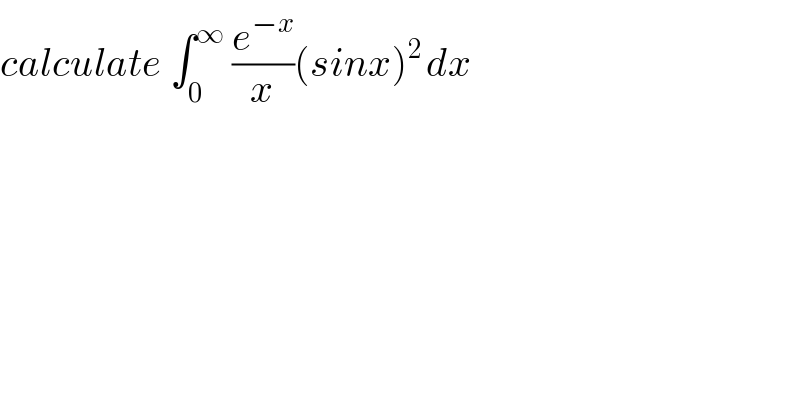Question Number 78708 by abdomathmax last updated on 20/Jan/20

Commented by mathmax by abdo last updated on 21/Jan/20
![let f(t) =∫_0 ^∞ (e^(−xt) /x)sin^2 x dx with t >0 we have f^′ (t) =−∫_0 ^∞ e^(−xt) sin^2 xdx =−∫_0 ^∞ e^(−xt) (1−cos(2x))dx =(1/2)∫_0 ^∞ e^(−xt) cos(2x)dx−(1/2)∫_0 ^∞ e^(−xt) dx ∫_0 ^∞ e^(−xt) dx =[−(1/t)e^(−xt) ]_(x=0) ^∞ =(1/t) ∫_0 ^∞ e^(−xt) cos(2x)dx =Re(∫_0 ^∞ e^(−xt+2ix) dx) ∫_0 ^∞ e^((−t+2i)x) dx =[(1/(−t+2i)) e^((−t+2i)x) ]_0 ^∞ =−(1/(−t+2i)) =(1/(t−2i)) =((t+2i)/(t^2 +4)) ⇒ ∫_0 ^∞ e^(−xt) cos(2x)dx =(t/(t^2 +4)) ⇒2f^′ (t)=(t/(t^2 +4))−(1/t) ⇒ 2f(t) =∫_1 ^t (u/(u^2 +4))−∫_1 ^t (du/u) +c =(1/2)[ln(u^2 +4)]_1 ^t −lnt +c ⇒ f(t)=(1/4){ln(t^2 +4)−ln(5)} −(1/2)ln(t) +c ∃m> /∫_0 ^∞ ∣((e^(−xt) sin^2 x)/x)∣dx≤m∫_0 ^∞ e^(−xt) dx =(m/t)→0(t→+∞) ⇒ lim_(t→+∞) f(t)=0 ⇒lim_(t→+∞) ln((((^4 (√(t^2 +1)))/( (√t)))) −(1/4)ln(5)+c =0 ⇒ c=(1/4)ln(5) ⇒f(t)=(1/4)ln(t^2 +4)−(1/2)ln(t) (t>0) ∫_0 ^∞ (e^(−x) /x)sin^2 x dx =f(1) =((ln(5))/4)](https://www.tinkutara.com/question/Q78943.png)
Answered by mind is power last updated on 20/Jan/20
![existence in 0 sin^2 (x)∼x^2 e^(−x) x is integrable in ∞ ((sin^2 (x))/x)<1⇒e^(−x) ((sin^2 (x))/x)<e^(−x) obvious let f(t)=∫_0 ^(+∞) (e^(−xt) /x)sin^2 (x)dx,t∈[1,∞[=I f well definde C_∞ in I lim_(t→∞) f(t)=0 proof u=xt⇒∫_0 ^(+∞) (e^(−u) /u)sin^2 ((u/t))du ∣sin((u/t))∣≤(u/t)⇒∫_0 ^(+∞) (e^(−u) /u)sin^2 ((u/t))du≤∫_0 ^(+∞) (e^(−u) /u)(u^2 /t^2 )du=(1/t^2 )∫_0 ^(+∞) ue^(−u) du=((Γ(1))/t^2 ) →0 as t→∞ (∂f/∂t)=∫_0 ^(+∞) −e^(−xt) sin^2 (x)dx=−∫_0 ^(+∞) e^(−xt) (((1−cos(2x))/2))dx =−(1/2)∫_0 ^(+∞) e^(−xt) dx+(1/2)∫_0 ^(+∞) e^(−xt) cos(2x)dx =(1/2)[(e^(−xt) /t)]_0 ^(+∞) +(1/2)Re{∫_0 ^(+∞) e^(x(−t+2i)) dt} =−(1/(2t))+(1/2)Re[(e^(x(−t+2i)) /(−t+2i))]_0 ^(+∞) =−(1/(2t))+(1/2)Re[(1/(t−2i))] =−(1/(2t))+(1/2)(t/(t^2 +4))=f′(t) f(1)=∫_∞ ^1 f′(t)dt=∫_∞ ^1 {−(1/(2t))+(t/(2(t^2 +4)))}dt=lim_(x→∞) [_x ^1 −(1/2)ln(t)+(1/4)ln(t^2 +4)] =lim_(x→∞) [_x ^1 (1/4)ln(((t^2 +4)/t^2 ))]=((ln(5))/4)−lim_(x→∞) ((ln(((x^2 +4)/x^2 )))/4)=((ln(5))/4)](https://www.tinkutara.com/question/Q78768.png)
Commented by mathmax by abdo last updated on 20/Jan/20

Commented by mind is power last updated on 21/Jan/20

Answered by M±th+et£s last updated on 20/Jan/20
![L{sin^2 (x)}=(1/2)L{(1−cos2x)}=(1/2){(1/s)−(s/(s^2 +4))} F(s)=L{((sin^2 x U(x))/x)}=∫_s ^∞ (1/2){(1/s) −(s/(s^2 +4))}ds =(1/2)[ln(s)−(1/2)ln(s^2 +4)]_s ^∞ =(1/4)[ln()]_s ^∞ =((−1)/4) ((s^2 /(s^2 +4))) ∫_0 ^∞ ((sin^2 (x) e^(−x) )/x) = F(1)=−(1/4)ln((1/5))=(1/4) ln(5)](https://www.tinkutara.com/question/Q78795.png)
Commented by M±th+et£s last updated on 20/Jan/20
![so sorry there is a typo (1/4)[ln((s^2 /(s^2 +4)))]_s ^∞](https://www.tinkutara.com/question/Q78796.png)
